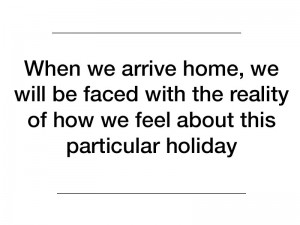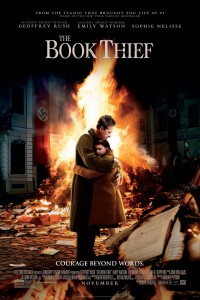Christmas (or Hanukkah or Kwanzaa etc., but for my purposes Christmas), is fast approaching. School has a tendency to push the holiday to the background, but very soon we will be suddenly remembering that we must buy gifts for parents and siblings and best friends before slogging home through December slush. And when we arrive, we will be faced with the reality of how we feel about this particular holiday.
Christmas is associated with joy and warm fuzzies, and comes with a wildly heightened atmosphere, more so than any other holiday in our society. It’s an atmosphere fed by people of ymany different backgrounds—Christians place exaggerated emphasis on family, love, and giving of oneself, and in general, everyone focuses on parties, food, festive décor, good cheer, and buying presents—of which consumer culture takes eager advantage.
In the movie Love Actually, a compilation romantic comedy set on the backdrop of the countdown to Christmas, the characters constantly use Christmas as both a reason and an excuse for their various behaviors. A secretary confesses her love to the Prime Minister, “Because, if you can’t say it at Christmas, when can you?” A groom’s best friend confesses his love to the bride, “Just because it’s Christmas, and at Christmas you tell the truth.” A boss urges his employee to confess her love to her co-worker, because “It’s Christmas.” Much is expected at Christmas. Much is connoted—people are meant to experience love and people are meant to travel to their childhood homes to gather around warm hearths and exchange heartfelt gifts with loving family members.
It’s a difficult time to have bad memories.
 The hefty amount of people with disjointed families and/or scarring experiences can easily feel marginalized when the seeming majority is swimming in a dream of sugar plums and packages tied up in string. My parents announced their divorce in the fall of my 7th grade year. Christmas was the last day we were ever together as a family. Fortunately, my experience has not soured my feelings towards the holiday itself as much as it could have, and as much as it certainly has for others with similar or worse experiences.
The hefty amount of people with disjointed families and/or scarring experiences can easily feel marginalized when the seeming majority is swimming in a dream of sugar plums and packages tied up in string. My parents announced their divorce in the fall of my 7th grade year. Christmas was the last day we were ever together as a family. Fortunately, my experience has not soured my feelings towards the holiday itself as much as it could have, and as much as it certainly has for others with similar or worse experiences.
Two years ago in a chapel service before Christmas break, Dr. Bruxvoort Lipscomb read her essay “On Death in December,” explaining her associations between death and Christmas. She listed three tragic deaths her life that had each occurred in December, and each involved a mother losing a son. Her essay focused on a painting of Madonna and Child by Bellini in which the Christ-child appears dead, and she pointed out that Christmas is, in reality, the celebration of a baby who was born so that he could eventually die. She concluded with confession that when she thinks of the births of her own children, she thinks also of their inevitable death. In that moment, it seemed to me an unnecessarily morbid distortion of what should be a joyful holiday.
A few weeks later, my aunt died.
I’ve since experienced my fair share of grief. My aunt was the second in a series of deaths of four loved ones over the past two years, and marked the first time that I glimpsed, from my stubborn place several rows back at the viewing, a disquietingly real body within a casket. Her death made true for me the words that Bruxvoort Lipscomb had shared: Christmas is indeed a season about “birthing death.”
While this truth may not have always been apparent to me throughout my life, I know now that it was the only reality for my mother. At childhood Christmases she would ever hang a small stocking for my deceased sister above the fireplace alongside the rest of the family’s larger, teeming stockings. She asked that we write notes to Baby Jesus and place them in the stocking, and I never understood the connection between my sister and Jesus, until two years ago. But for her, and for Bruxvoort Lipscomb, and for many others like them, Christmas has always meant something a little different.
It’s common for people with contrasting experiences to feel animosity towards one another. Those who have had mostly pleasant Christmases throughout their lives, as I have, tend to feel that those who appear more cynical are putting a damper on the Christmas spirit. Those who have not been so fortunate tend to feel isolated and misunderstood. Christmas needs to be sacred. Christmas needs to be changed. Christmas is perfect. Christmas is unimportant.
I don’t think Christmas is really either of these things.
Similar to the inflated perception of what a “Christian family” should look like, the concept of Christmas tradition is also far from what the Christian religion would actually call for. We started out with the basic idea for a celebration of Jesus’ birth, and tacked on pagan practices along the way, partly to aid with evangelical efforts, partly just for fun. Like Valentine’s Day, the holiday is now so strongly tied to distorted, Hollywood versions of love that do more harm than good. But Valentine’s Day is a simple holiday, based primarily on legends and trivial customs. Christmas is not such a throwaway holiday. Christmas has roots that are vitally important to Christian beliefs, and it should not be treated in the same way. Both overly positive and overly negative perspectives on Christmas are too simplified to do it justice.
I have found great hope in the Christmas story of Jesus’ birth and promise, but I have also found great hope in Bruxvoort Lipscomb’s version of Christmas, one that takes an honest look at the future of the baby Jesus. Taking both viewpoints together can lend to the holiday the depth and dignity that it deserves. Don’t cheat yourself this Christmas by focusing on only one aspect of your experience. To be sure, Christmas is a time of deep joy, but it is not a holiday to be taken lightly.

